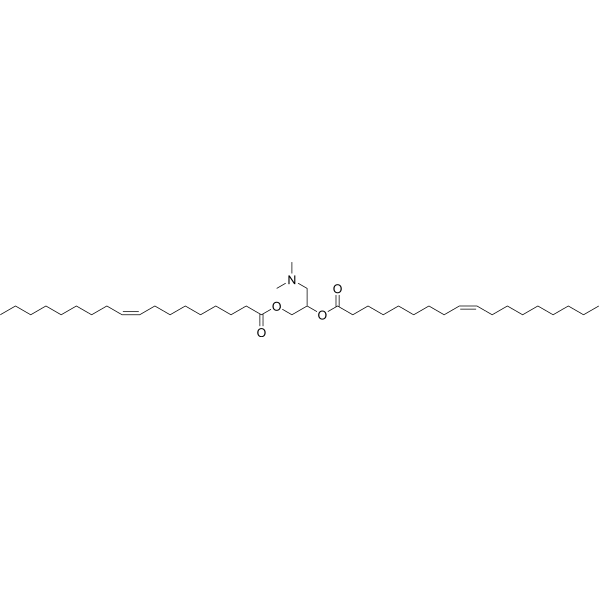All AbMole products are for research use only, cannot be used for human consumption.

DODAP is a cationic lipid. The ionizable lipid DODAP is a lipid component of the liposome. DODAP can be used to encapsulate siRNA, immunostimulatory chemotherapeutic agents for in vitro and in vivo delivery and so on.
1,2-Dioleoyl-3-dimethylammonium-propane (DODAP) is an ionizable cationic lipid (pKa = 5.59 in a TNS binding assay). It has been used as a component in liposomes that can be used to encapsulate siRNA, immunostimulatory oligodeoxynucleotides, antisense oligonucleotides, or chemotherapeutic agents for in vitro and in vivo delivery.
| Molecular Weight | 648.05 |
| Formula | C41H77NO4 |
| CAS Number | 127512-29-2 |
| Form | Oily Liquid |
| Solubility (25°C) | DMSO 90 mg/mL |
| Storage | -20°C, protect from light, sealed |
| Related Cell Transfection Products |
|---|
| HBpep(RPY)-SP acetate
HBpep(RPY)-SP acetate is a variant of the polypeptide HBpep-SP. HBpep(RPY)-SP acetate interacts with lipid bilayers and has demonstrated exceptional transfection efficiency in challenging-to-transfect cells, such as primary and immune cells. HBpep(RPY)-SP acetate is useful for research in protein, gene, and immune cell therapies. |
| Chitosan (≥95% deacetylated, MW 50000-60000)
Chitosan (≥95% deacetylated, MW 50000-60000) is a polycationic linear polysaccharide derived from chitin .Chitosan is non-toxic, hypoallergenic, biocompatible, biodegradable, and possesses anti-tumor, anti-bacterial, anti-fungal, and antioxidant activities.Chitosan can be used in studies related to drug delivery and cell transfection. |
| DOTAP methylsulfate
DOTAP methylsulfate is a cationic derivative of trimethylammonium attached to two 18-carbon fatty acid tails, each with a single alkene group. 18:1 TAP is a cationic liposome-forming compound useful for the transfection of DNA, RNA, and other negatively charged molecules into eukaryotic cells. |
| Chitosan (MW 150000)
Chitosan (MW 150000) is a polycationic linear polysaccharide derived from chitin with a molecular weight of 150000.Chitosan is non-toxic, hypoallergenic, biocompatible, biodegradable, and possesses anti-tumor, anti-bacterial, anti-fungal, and anti-oxidant activities.Chitosan can be used in studies related to drug delivery and cell transfection. |
| Chitosan (MW 30000)
Chitosan (MW 30000) is a polycationic linear polysaccharide derived from chitin with a molecular weight of 30,000.Chitosan is non-toxic, hypoallergenic, biocompatible, biodegradable, and possesses anti-tumor, anti-bacterial, anti-fungal, and antioxidant activities.Chitosan can be used in studies related to drug delivery and cell transfection. |
All AbMole products are for research use only, cannot be used for human consumption or veterinary use. We do not provide products or services to individuals. Please comply with the intended use and do not use AbMole products for any other purpose.


Products are for research use only. Not for human use. We do not sell to patients.
© Copyright 2010-2024 AbMole BioScience. All Rights Reserved.
